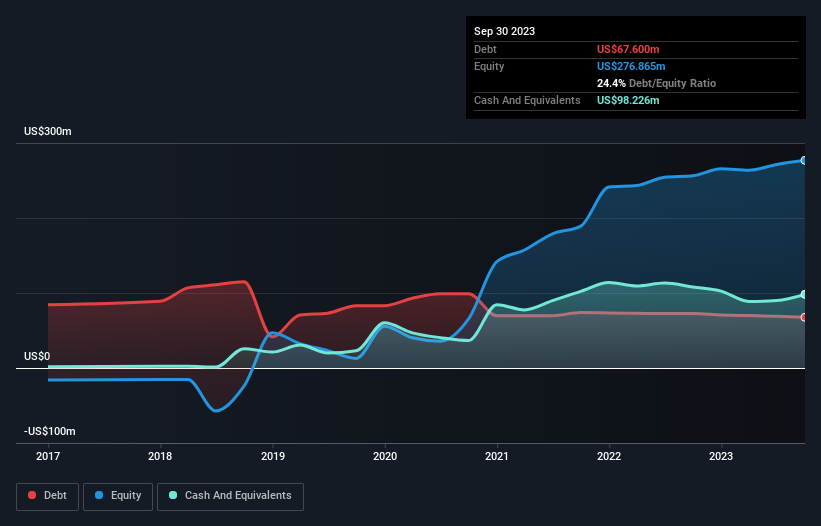- United States
- /
- Biotech
- /
- NasdaqCM:ORGO
These 4 Measures Indicate That Organogenesis Holdings (NASDAQ:ORGO) Is Using Debt Reasonably Well
Some say volatility, rather than debt, is the best way to think about risk as an investor, but Warren Buffett famously said that 'Volatility is far from synonymous with risk.' When we think about how risky a company is, we always like to look at its use of debt, since debt overload can lead to ruin. As with many other companies Organogenesis Holdings Inc. (NASDAQ:ORGO) makes use of debt. But the real question is whether this debt is making the company risky.
When Is Debt A Problem?
Debt assists a business until the business has trouble paying it off, either with new capital or with free cash flow. Ultimately, if the company can't fulfill its legal obligations to repay debt, shareholders could walk away with nothing. While that is not too common, we often do see indebted companies permanently diluting shareholders because lenders force them to raise capital at a distressed price. Of course, debt can be an important tool in businesses, particularly capital heavy businesses. The first thing to do when considering how much debt a business uses is to look at its cash and debt together.
View our latest analysis for Organogenesis Holdings
What Is Organogenesis Holdings's Debt?
As you can see below, Organogenesis Holdings had US$67.6m of debt at September 2023, down from US$72.6m a year prior. However, it does have US$98.2m in cash offsetting this, leading to net cash of US$30.6m.

How Strong Is Organogenesis Holdings' Balance Sheet?
Zooming in on the latest balance sheet data, we can see that Organogenesis Holdings had liabilities of US$81.5m due within 12 months and liabilities of US$104.3m due beyond that. Offsetting these obligations, it had cash of US$98.2m as well as receivables valued at US$89.3m due within 12 months. So these liquid assets roughly match the total liabilities.
This state of affairs indicates that Organogenesis Holdings' balance sheet looks quite solid, as its total liabilities are just about equal to its liquid assets. So it's very unlikely that the US$487.2m company is short on cash, but still worth keeping an eye on the balance sheet. Simply put, the fact that Organogenesis Holdings has more cash than debt is arguably a good indication that it can manage its debt safely.
The modesty of its debt load may become crucial for Organogenesis Holdings if management cannot prevent a repeat of the 48% cut to EBIT over the last year. Falling earnings (if the trend continues) could eventually make even modest debt quite risky. When analysing debt levels, the balance sheet is the obvious place to start. But it is future earnings, more than anything, that will determine Organogenesis Holdings's ability to maintain a healthy balance sheet going forward. So if you want to see what the professionals think, you might find this free report on analyst profit forecasts to be interesting.
Finally, a company can only pay off debt with cold hard cash, not accounting profits. Organogenesis Holdings may have net cash on the balance sheet, but it is still interesting to look at how well the business converts its earnings before interest and tax (EBIT) to free cash flow, because that will influence both its need for, and its capacity to manage debt. In the last three years, Organogenesis Holdings's free cash flow amounted to 28% of its EBIT, less than we'd expect. That weak cash conversion makes it more difficult to handle indebtedness.
Summing Up
While we empathize with investors who find debt concerning, you should keep in mind that Organogenesis Holdings has net cash of US$30.6m, as well as more liquid assets than liabilities. So we don't have any problem with Organogenesis Holdings's use of debt. There's no doubt that we learn most about debt from the balance sheet. However, not all investment risk resides within the balance sheet - far from it. We've identified 1 warning sign with Organogenesis Holdings , and understanding them should be part of your investment process.
At the end of the day, it's often better to focus on companies that are free from net debt. You can access our special list of such companies (all with a track record of profit growth). It's free.
New: AI Stock Screener & Alerts
Our new AI Stock Screener scans the market every day to uncover opportunities.
• Dividend Powerhouses (3%+ Yield)
• Undervalued Small Caps with Insider Buying
• High growth Tech and AI Companies
Or build your own from over 50 metrics.
Have feedback on this article? Concerned about the content? Get in touch with us directly. Alternatively, email editorial-team (at) simplywallst.com.
This article by Simply Wall St is general in nature. We provide commentary based on historical data and analyst forecasts only using an unbiased methodology and our articles are not intended to be financial advice. It does not constitute a recommendation to buy or sell any stock, and does not take account of your objectives, or your financial situation. We aim to bring you long-term focused analysis driven by fundamental data. Note that our analysis may not factor in the latest price-sensitive company announcements or qualitative material. Simply Wall St has no position in any stocks mentioned.
About NasdaqCM:ORGO
Organogenesis Holdings
A regenerative medicine company, develops, manufactures, and commercializes products for the advanced wound care, and surgical and sports medicine markets in the United States.
Excellent balance sheet with reasonable growth potential.
Similar Companies
Market Insights
Community Narratives




